|
|
|
Sort Order |
|
|
|
Items / Page
|
|
|
|
|
|
|
| Srl | Item |
| 1 |
ID:
093979
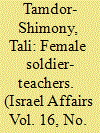

|
|
|
|
|
| Publication |
2010.
|
| Summary/Abstract |
This article deals with the topic of female soldiers teaching in Israeli primary schools in immigrant communities in the periphery in the 1950s and 1960s. At that time there was a great shortage of teachers, owing to the enormous increase in the number of pupils in the education system, in the wake of the great waves of immigration. Ben-Gurion decided that the army must forgo this quality labour force, suitable for service as officers, to meet the education needs of the outlying areas. The soldier-teachers were young girls, most of them born in the country, who had gone through the Hebrew education system, had 12-14 years of schooling and perceived their teaching in immigrant settlements as voluntary pioneering work. They were the representatives of the two main socializing agents of the new state - the army and the education system. The IDF considered them to be soldiers, lent out to perform civilian tasks, and paid their salaries and was responsible for their living conditions, including their lodging, while the Ministry of Education perceived them as bearers of knowledge, teaching children living in the periphery. However, the female soldier-teachers, living within the immigrant communities, also functioned in other capacities, such as advising their pupils' older sisters and assisting the families in various ways. Some of the schoolgirls also saw them as examples of educated independent women. Through their activity, these soldier-teachers actually embodied the multifaceted formative ethos of Israeli society: Jewish sovereignty, intermingling of exiles and immigrant absorption (the melting pot version), formal gender equality (military service for women), and commitment by the modern state to provide basic education for all its citizens.
|
|
|
|
|
|
|
|
|
|
|
|
|
|
|
|
| 2 |
ID:
036652
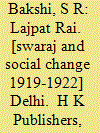

|
|
|
|
|
| Publication |
DelhI, H K Publishers, 1990.
|
| Description |
386p.Hbk
|
| Contents |
Vol.2: 1919-22
|
| Standard Number |
8185318298
|
|
|
|
|
|
|
|
|
|
|
|
Copies: C:1/I:0,R:0,Q:0
Circulation
| Accession# | Call# | Current Location | Status | Policy | Location |
| 031750 | 923.2/BAK 031750 | Main | On Shelf | General | |
|
|
|
|
| 3 |
ID:
134379
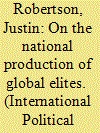

|
|
|
|
|
| Summary/Abstract |
A small but dominant group of global financial elites has been trained in France. These elites hold powerful positions in the global derivatives industry, most prominently in the field of equity derivatives. The specialized French role is both a cause and a consequence of the intensifying use of derivatives, one of the major developments in global financial capitalism. Equity derivatives have spread from France to Europe, and now to Asia, with London and Hong Kong serving as control centers. Three factors are key in explaining the French niche in global derivatives. First, particular characteristics of national systems, in this case highly advanced French mathematics education, can spawn market dominance in specific areas of the global economy. Second, French networks, founded on shared experiences in French schools and French banks, are both relatively closed and highly portable across national borders. Third, new actors in developed and developing regions of the global economy are driving demand for derivatives products that are designed by French trained elites in French banks and especially in global banks. The global financial crisis has neither derailed the demand for derivatives nor, consequently, the role French engineering schools play in educating some of the top global financial practitioners.
|
|
|
|
|
|
|
|
|
|
|
|
|
|
|
|
| 4 |
ID:
153347
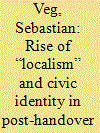

|
|
|
|
|
| Summary/Abstract |
While it was traditionally accepted that Hongkongers shared a form of pan-Chinese cultural identification that did not contradict their local distinctiveness, over the last decade Hong Kong has seen the rise of new types of local identity discourses. Most recently, “localists” have been a vocal presence. Hong Kong has – quite unexpectedly – developed a strong claim for self-determination. But how new is “localism” with respect to the more traditional “Hong Kong identity” that appeared in the 1970s? The present study takes a two-dimensional approach to study these discourses, examining not only their framework of identification (local versus pan-Chinese) but also their mode of identification (ethno-cultural versus civic). Using three case studies, the June Fourth vigil, the 2012 anti-National Education protest and the 2014 Umbrella movement, it distinguishes between groups advocating civic identification with the local community (Scholarism, HKFS) and others highlighting ethnic identification (Chin Wan). It argues that while local and national identification were traditionally not incompatible, the civic-based identification with a local democratic community, as advocated by most participants in recent movements, is becoming increasingly incompatible with the ethnic and cultural definition of the Chinese nation that is now being promoted by the Beijing government.
|
|
|
|
|
|
|
|
|
|
|
|
|
|
|
|
| 5 |
ID:
159368
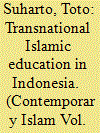

|
|
|
|
|
| Summary/Abstract |
This article analyzes how the emergence of transnational Islam with its global network has changed the face of Indonesian Islam. As part of transnational Islam, the Salafi movement has embellished its ideology through the educational sphere, so it is called transnational Islamic education. The Integrated Islamic School and the Institute of Islamic and Arabic Sciences show the ideological nuances in the education process of these two educational institutions. In this context, there is an ideological struggle between both the Egyptian and the Saudian model of Salafi education with the national education based on Pancasila. With the main agenda of the establishment of an Islamic state and putting the Shariah into practice, the Salafi education can pose a threat to global democratic order. Many cases indicate that perpetrators of global radicalism and terrorism are graduates of Salafi model schools. This proves that global democracy is currently in an ideological struggle with transnational Islamic education.
|
|
|
|
|
|
|
|
|
|
|
|
|
|
|
|
|
|
|
|
|